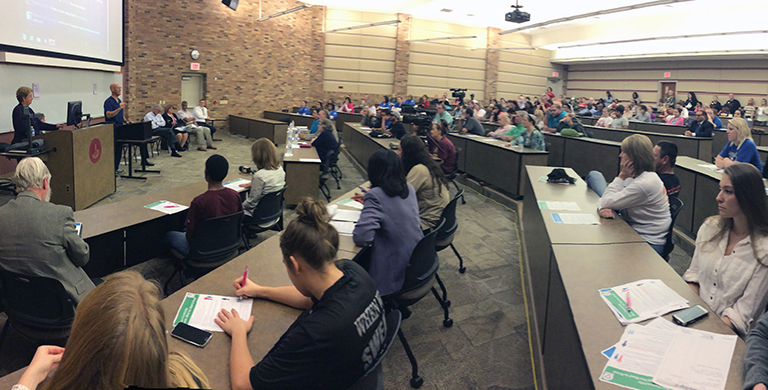
About 120 people attended a community meeting on Ebola Oct. 21 in Dillard 101 with a room full to overflowing and more than 20 others watching a video broadcast of it in a nearby room.
Keith Williamson, MWSU medical director said, “This particular outbreak is scaring the beaus out of us.” However, he added, “I cannot conceive this would start a large-scale outbreak here. Your chance of contracting Ebola here is zero. If you haven’t been around the blood or poop of something with Ebola then you don’t have Ebola.”
“Should we be careful? Sure,” David Carlston, assistant professor of psychology, said. “Everyone’s here because we’re concerned about contracting a virus that could potentially kill us.”
But he asked the crowd if they had had their regular physical or important exams to make the point that there are other medical problems that are a much greater risk for the general population. Few said yes. In particular, he pointed out that few had had their flu vaccinations and the flu typically kills thousands of people according to the Centers for Disease Control.
Robert McBroom, infectious disease specialist, said, “More people will die from the flu than Ebola, focus your concern on how to not catch the flu.”
Scott Hoyer, chief medical officer at United Regional Hospital, “The two most important antidotes to hysteria are information and confident preparedness.”
He said, “We are prepared in terms of asking the right questions (of potential patients).” And later, Lou Kreidler, said they had worked with emergency medical services, dispatchers and first responders in Wichita County to ask patients questions about travel and symptoms before ever making patient contact.
“Even if the worst happened (and we got a patient with Ebola in Wichita County),” Hoyer said, “we would be prepared to take care of that patient.”
Kreidler said, “When you talk about Ebola, it is scary.” However, she said talk about emergency preparedness isn’t new in Texas comparing the disease to a food-borne disease or tuberculosis.
She said, “We don’t have any confirmed cases of entero virus in Wichita Falls. Really good hand washing is the best thing that we can do. Wash your hands. Wash your hands. Wash your hands.”
“If you haven’t had any contact, you do not have Ebola,” Kreidler later added.
“Just because the disease has a high fatality rate and it’s new doesn’t mean we have a higher chance of getting it,” said Carlson warning against giving into panic and taking answers from the audience and via Twitter using #mwsuthebige.
READ MORE: Ebola: Just wash your hands
READ MORE: Compare and contrast Ebola and the flu
















